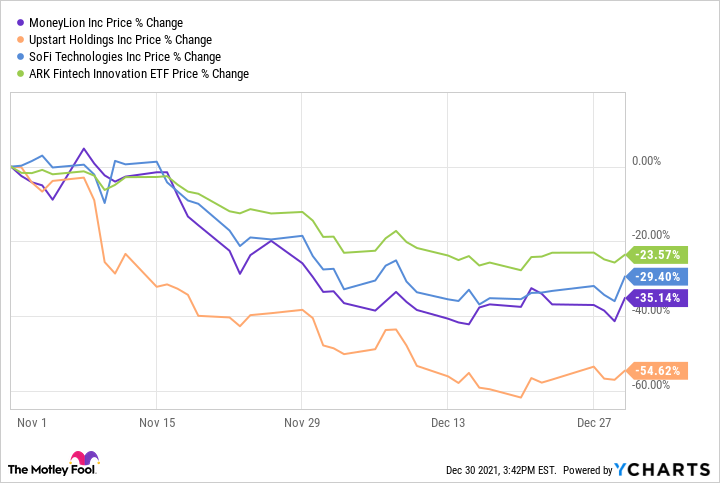Key Points
- The Labor Department reported fewer jobless claims than what experts had been projecting.
- Fintech stocks have sold off broadly over the past few months.
- Valuations are better, although not necessarily cheap.
What happened
Shares of many fintech stocks bounced higher on the second-to-last day of trading in 2021, which seemed to be related to a jobless claims report that was better than expected. Shares of the artificial intelligence personal loan company Upstart (NASDAQ:UPST)$Upstart Holdings, Inc.(UPST)$ rose nearly 5% today, while shares of the digital financial services company SoFi (NASDAQ:SOFI$SoFi Technologies Inc.(SOFI)$ ) and fintech MoneyLion (NYSE:ML)$MoneyLion Inc.(ML)$ both rose more than 10%.
So what
Weekly jobless claims for the week ending Dec. 25 totaled 198,000, beating the 205,000 forecast, which is near the lowest level in 50 years.
Gus Faucher, chief economist at PNC, wrote in a research note:
Initial claims are extremely low, and continued claims are low and steadily declining. Demand for labor is very strong and workers are in short supply, so businesses are not laying off employees. Those workers who do find themselves unemployed can quickly find new jobs.
On the one hand, the news is somewhat positive because it shows that businesses still seem to be operating like normal and not laying off workers or shutting down after the discovery of the extremely contagious omicron COVID-19 variant. Still, that doesn't mean there won't be any impact from omicron in the near term.
" ... rising coronavirus cases due to the omicron could put the labor force recovery on hold, at least over the next couple of months," Faucher added.
The jobless claims report seemed to provide a good excuse for investors to buy back into popular fintech stocks that have really been hammered over the past few months.

Then omicron hit and investors feared how the variant or future similar variants might impact economic growth in 2022. Goldman Sachs recently cut its projection for gross domestic product slightly in each of the first three quarters of 2022.
Now what
Valuations in the fintech sector had certainly run hot for most of this year, with Upstart in October trading at close to 40 times 2022 revenue. Even after the sell-off, Upstart currently trades around 66 times the current average earnings estimate for 2022. Valuations like this don't leave a lot of room for error, so I think a sell-off for some of these highly valued fintech stocks was certainly warranted.
Valuations now look a little better, but given that market conditions could be difficult next year, especially with the strong potential for rate hikes, I would much rather own fintech stocks that have more reasonable valuations and that are potentially undervalued.
Based on its projections, MoneyLion looks more reasonably valued right now. But seeing as the company went public through a special purpose acquisition company (SPAC), and SPACs have seen a good deal of skepticism in recent months, investors are likely going to wait to see that actual results are in line with projections before potentially buying in.
Comments